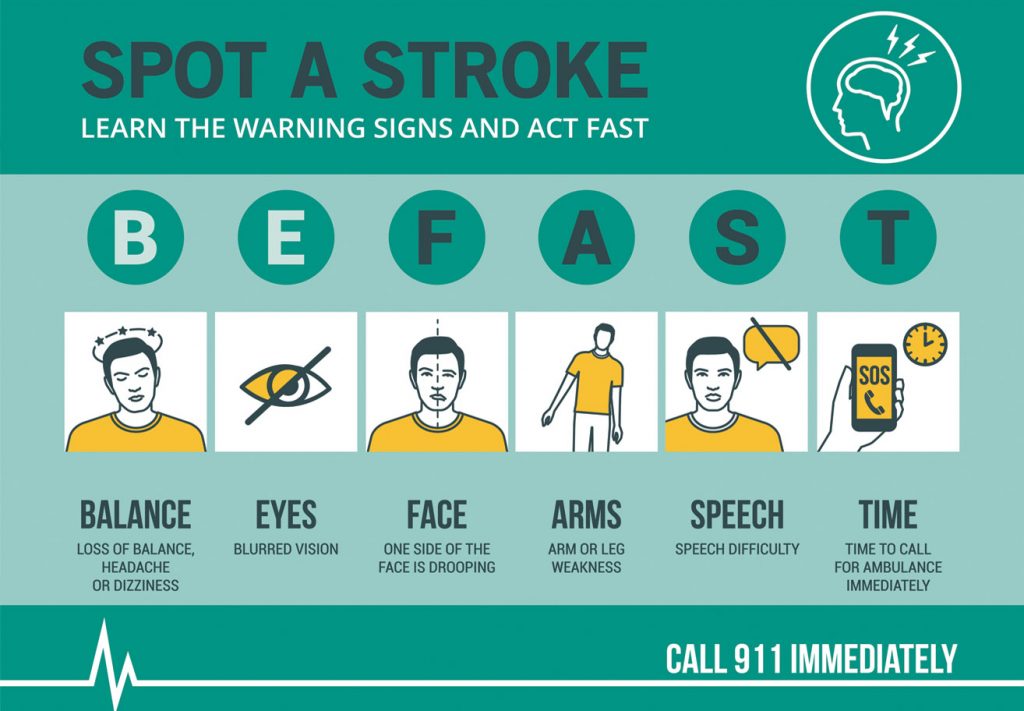When it comes to a stroke, it is crucial to recognize the warning signs and act swiftly. A stroke occurs when the blood supply to the brain is disrupted, either by a blood clot blocking an artery (ischemic stroke) or when a blood vessel bursts (hemorrhagic stroke). Immediate medical attention is essential to minimize damage and improve the chances of recovery.
Ralph Gonzalez, MD, a neurologist at Manatee Memorial Hospital, identifies six warning signs of stroke to help you recognize and respond promptly in the case of an emergency.

1. Sudden Weakness or Numbness: One of the most common signs of stroke is sudden weakness or numbness, especially on one side of the body. This can manifest as drooping of the face, weakness in an arm or leg, or difficulty in moving one side of the body.
2. Trouble Speaking or Understanding Speech: Stroke can affect speech and language abilities. Individuals may experience slurred speech, difficulty in finding the right words, or confusion when trying to understand others.
3. Vision Problems: Blurred vision or sudden loss of vision in one or both eyes can be indicative of a stroke. Some people may also experience double vision or difficulty in seeing clearly.
4. Severe Headache: A sudden and severe headache, often described as the worst headache of one’s life, can be a warning sign of a stroke, especially if it occurs without any apparent cause.
5. Dizziness or Loss of Balance: Stroke can cause sudden dizziness, loss of balance, or coordination difficulties, making it challenging to walk or stand steadily.
6. Trouble Walking: Difficulty walking or sudden loss of coordination, similar to that of intoxication, can be a sign of stroke. Individuals may stumble, feel unsteady, or struggle to maintain their balance.
Think B.E.F.A.S.T.
Recognizing the signs of stroke and acting swiftly is crucial for minimizing brain damage and improving outcomes.
. Balance: Is the person experiencing dizziness or having trouble walking?
. Eye: Is the person having trouble seeing in one or both eyes?
. Face Drooping: Ask the person to smile. Is one side of their face drooping?
. Arm Weakness: Ask the person to raise both arms. Does one arm drift downward?
. Speech Difficulty: Ask the person to repeat a simple phrase. Is their speech slurred or strange?
. Time to Call 911: If you observe any of these signs, it’s time to call 911 immediately.
Time lost is brain lost. Stroke is a medical emergency, and every minute counts. Quick action can make a significant difference in the outcome and quality of life for someone who is experiencing a stroke. Educate yourself and others about the warning signs, and remember, acting fast can save lives.
At the Stroke and Cerebrovascular Center at Manatee Memorial Hospital, stroke patients receive specially designed services and treatments which focus on prevention and intervention, as well as rehabilitation and education.
For more information, visit manateememorial.com/stroke
206 Second Street East
Bradenton, FL 34208
941-746-5111
Physicians are on the medical staff of Manatee Memorial Hospital but, with limited exceptions, are independent practitioners who are not employees or agents of Manatee Memorial Hospital. The hospital shall not be liable for actions or treatments provided by physicians. For language assistance, disability accommodations and the nondiscrimination notice, visit our website.









